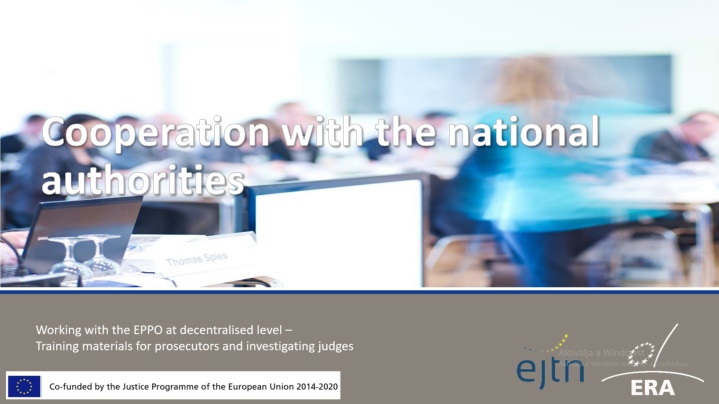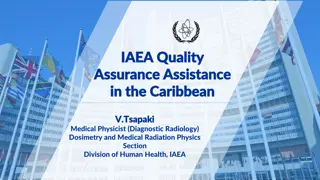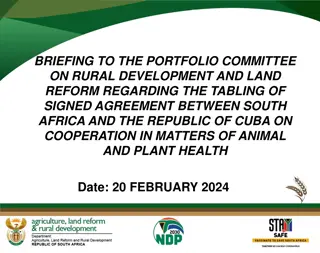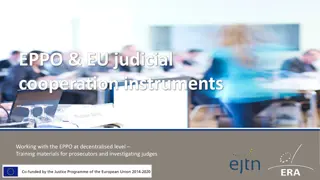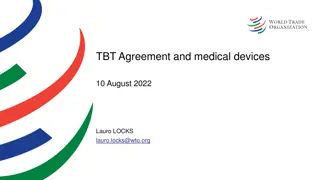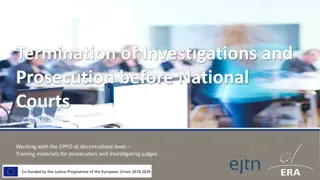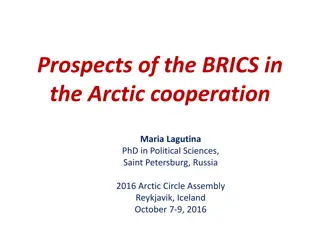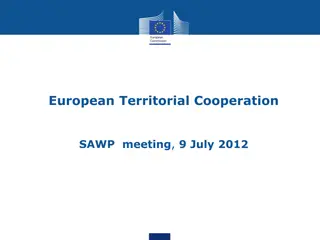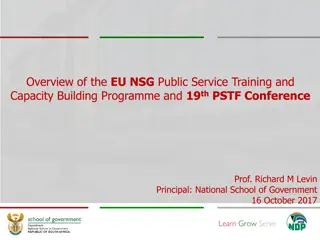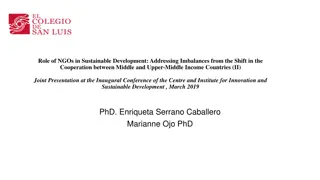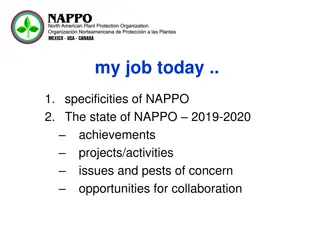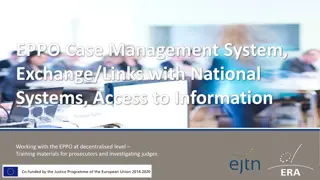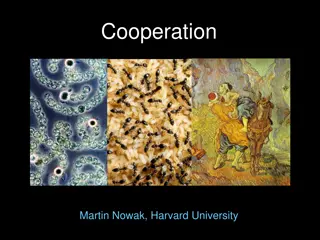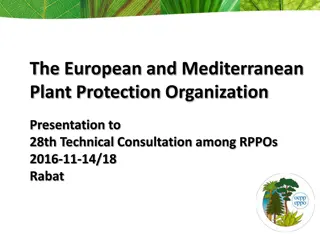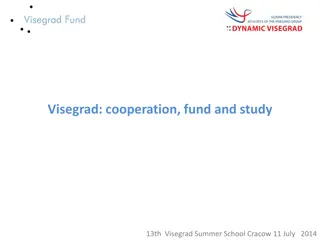National Authorities' Cooperation and Information Flow Guidelines
The provided content outlines the importance of cooperation between the European Public Prosecutor's Office (EPPO) and national authorities. It emphasizes the prompt sharing of information on criminal offenses to enable effective investigation and decision-making. The document details the responsibilities of national law enforcement agencies, including police, financial police, customs, and tax offices, in reporting and evaluating allegations. Additionally, it underlines the procedure for informing the EPPO when initiating investigations related to offenses falling within its jurisdiction.
Download Presentation

Please find below an Image/Link to download the presentation.
The content on the website is provided AS IS for your information and personal use only. It may not be sold, licensed, or shared on other websites without obtaining consent from the author.If you encounter any issues during the download, it is possible that the publisher has removed the file from their server.
You are allowed to download the files provided on this website for personal or commercial use, subject to the condition that they are used lawfully. All files are the property of their respective owners.
The content on the website is provided AS IS for your information and personal use only. It may not be sold, licensed, or shared on other websites without obtaining consent from the author.
E N D
Presentation Transcript
Cooperation with the national authorities
Introduction Introduction Provisions/Principles Recital 49, 52, 53 information flow Recital 58, 60, 61, 62, 69, 77, 87 operational cooperation Art. 5 para 6 Art. 24, 25, 27,28 operational cooperation Art. 34 2
General principle General principle Cooperation between EPPO and national authorities Different levels of cooperation Information flow Operational 3
Information flow Information flow National authorities shall provide without delay any information to the EPPO about offences in respect of which it could exercise its competence. The national authorities of the Member States should follow the existing reporting procedures and have in place efficient mechanisms for a preliminary evaluation of allegations reported to them. 4
Information flow Information flow Meaning of national authorities : any law enforcement authority Police, financial police, customs, tax offices, agencies dealing with distribution of EU funds, ministries 5
Information flow Information flow When a judicial or law enforcement authority of a Member State initiates an investigation in respect of a criminal offence falling into the EPPO competence or where, at any time after the initiation of an investigation, it appears to the competent judicial or law enforcement authority of a Member State that an investigation concerns such an offence, that authority shall without undue delay inform the EPPO so that the latter can decide whether to exercise its right of evocation 6
Information flow Information flow When a judicial or law enforcement authority of a Member State initiates an investigation in respect of a criminal offence as defined in Article 22 and considers that the EPPO could, in accordance with Article 25(3), not exercise its competence, it shall inform the EPPO thereof. The report shall contain, as a minimum, a description of the facts, including an assessment of the damage caused or likely to be caused, the possible legal qualification and any available information about potential victims, suspects and any other involved persons. 7
Information flow Information flow Where it comes to the knowledge of the EPPO that a criminal offence outside of the scope of the competence of the EPPO may have been committed, it shall without undue delay inform the competent national authorities and forward all relevant evidence to them. 8
Information flow Information flow In specific cases, the EPPO may request further relevant information available to the authorities of the Member States. 9
Information flow Information flow Transfer of evidence: from administrative stage to judicial stage Legal issues admissibility of evidence In some systems, where in administrative proceedings there are reasonable grounds to believe that criminal offences have been committed, it must continue under the rules of the criminal procedure code (Italian c.p.c., art. 220 of the implementing rules) 10
Operational cooperation Operational cooperation abstention from acting acting abstention from During the time the EPPO decides on the evocation (art. 27): the national authorities shall refrain from taking any decision under national law that may have the effect of precluding the EPPO from exercising its right of evocation. The national authorities shall take any urgent measures necessary, under national law, to ensure effective investigation and prosecution. 11
Operational cooperation Operational cooperation right of evocation right of evocation During the time the EPPO decides on the evocation (art. 27): the EPPO shall, where appropriate, authorities of the Member State concerned before deciding whether to exercise its right of evocation. consult the competent 12
Operational cooperation Operational cooperation right of evocation right of evocation Where the EPPO exercises its right of evocation, the competent authorities of the Member States shall transfer the file to the EPPO and refrain from carrying out further acts of investigation in respect of the same offence. 13
Operational cooperation Operational cooperation right of evocation right of evocation Where the EPPO has refrained from exercising its competence, it shall inform the competent national authorities without undue delay. At any time in the course of the proceedings, the competent national authorities shall inform the EPPO of any new facts which could give the EPPO reason to reconsider its decision not to exercise competence. 14
Operational cooperation Operational cooperation The European Delegated Prosecutor handling a case may, in accordance with the Regulation and with national law, either undertake the investigation measures and other measures on his/her own or instruct the competent authorities in his/her Member State. Those authorities shall, in accordance with national law, ensure that all instructions are followed and undertake the measures assigned to them. 15
Operational cooperation Operational cooperation At any time during the investigations conducted by the EPPO, the competent national authorities shall take urgent measures in accordance with national law necessary to ensure effective investigations even where not specifically acting under an instruction given by the handling European Delegated Prosecutor. The national authorities shall without undue delay inform the handling European Delegated Prosecutor of the urgent measures they have taken. 16
Operational cooperation Operational cooperation In exceptional cases, after having obtained the approval of the competent Permanent Chamber, the Prosecutor may take a reasoned decision to conduct the investigation personally, either by personally undertaking the investigation measures and other measures or by instructing the competent authorities in his/her Member State, where this appears to be indispensable in the interest of the efficiency to the investigation or prosecution supervising European 17
Operational cooperation Operational cooperation referral of cases referral of cases Art. 34: Where an investigation conducted by the EPPO reveals that the facts subject to investigation do not constitute a criminal offence for which it is competent under Articles 22 and 23, the competent Permanent Chamber shall decide to refer the case without undue delay to the competent national authorities. 18
Operational cooperation Operational cooperation referral of cases referral of cases Art. 34: Where an investigation conducted by the EPPO reveals that the specific conditions for the exercise of its competence set out in Article 25(2) and (3) are no longer met, the competent Permanent Chamber shall decide to refer the case to the competent national authorities without undue delay and before initiating prosecution at national courts. 19
Operational cooperation Operational cooperation referral of cases referral of cases Art. 34: Offences which caused or are likely to cause damage to the financial interests of the Union of less than EUR 100 000: When the College considers that, with reference to the degree of seriousness of the offence or the complexity of the proceedings in the individual case, there is no need to investigate or to prosecute a case at Union level and that it would be in the interest of the efficiency of investigation or prosecution, it shall issue general guidelines allowing the Permanent Chamber to refer a case to the competent national authorities. 20
Operational cooperation Operational cooperation referral of cases referral of cases Art 34: Such guidelines shall also allow the Permanent Chamber to refer a case to the competent national authorities where the EPPO exercises a competence in respect of offences referred to in points (a) and (b) of Article 3(2) of Directive (EU) 2017/1371 and where the damage caused or likely to be caused to the Union s financial interests does not exceed the damage caused or likely to be caused to another victim. 21
Operational cooperation Operational cooperation referral of cases referral of cases Art 34:The Permanent Chamber shall communicate any decision to refer a case to national authorities on the basis of paragraph 3 to the European Chief Prosecutor. Within 3 days of receiving of this information, the European Chief Prosecutor may request the Permanent Chamber to review its decision if the European Chief Prosecutor considers that the interest to ensure the coherence of the referral policy of the EPPO so requires. 22
Operational cooperation Operational cooperation referral of cases referral of cases Art 34: Where the competent national authorities do not accept taking over the case in accordance with paragraphs 2 and 3 within a timeframe of maximum 30 days, the EPPO shall remain competent to prosecute or dismiss the case, in accordance with the rules laid down in this Regulation. 23
